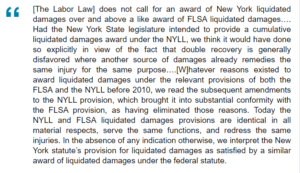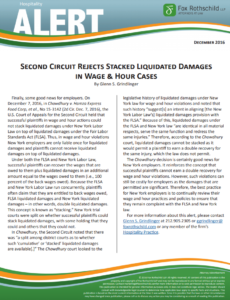In a summary order issued on December 7, the Court of Appeals for the Second Circuit–in Chowdhury v. Hamza Express Food Corp., No. 15‐3142‐cv–held that an award of liquidated damages under both the Fair Labor Standards Act and the New York Labor Law with respect to the same violation was improper:

The decision is a welcome one for employers facing federal and state wage and hour claims in district court.

Finally, some good news for employers. On December 7, 2016, in Chowdhury v. Hamza Express Food Corp, et al., No 15-3142 (2d Cir. Dec. 7, 2016), the U.S. Court of Appeals for the Second Circuit held that successful plaintiffs in wage and hour actions could not stack liquidated damages under New York Labor Law on top of liquidated damages under the Fair Labor Standards Act (FLSA). Thus, in wage and hour violations New York employers are only liable once for liquidated damages and plaintiffs cannot receive liquidated damages on top of liquidated damages.
Under both the FLSA and New York Labor Law, successful plaintiffs can recover the wages that are owed to them plus liquidated damages in an additional amount equal to the wages owed to them (i.e., 100 percent of the back wages owed). Because the FLSA and New York Labor Law run concurrently, plaintiffs often claim that they are entitled to back wages owed, FLSA liquidated damages and New York liquidated damages – in other words, double liquidated damages. This concept is known as “stacking.” New York trial courts were split on whether successful plaintiffs could stack liquidated damages, with some holding that they could and others that they could not.
Judge Nicholas Garaufis
Click here to see Judicial Profile
Gayle and her co-plaintiff nurses were employed by Harry’s Nurses Registry. The court granted collective action certification of their Fair Labor Standards Act suit over unpaid overtime. It also granted them summary judgment as to liability. Granting plaintiffs summary judgment as to damages, the court awarded them $619,071. Based on the record evidence opt-in plaintiffs were entitled to $309,535 in unpaid overtime premiums. In finding plaintiffs entitled to that same amount in liquidated damages pursuant to 29 USC §216(c), the court observed that its determination that defendants did not show good faith with respect to Gayle sufficient to overcome the presumption favoring liquidated damages, was equally true with respect to the opt-in plaintiffs. Despite denying defendants’ motion to strike plaintiffs’ reply memorandum of law, the court denied plaintiffs’ motion seeking sanctions under 28 USC §1927 for the strike motion. Noting that some of defendants’ assertions within the strike motion held merit, the court rejected plaintiffs’ claim that the strike motion had been brought in bad faith solely for dilatory purposes because it discussed only de minimus ambiguities and discrepancies in plaintiffs’ documentary evidence.
Link: https://www.law.com/newyorklawjournal/almID/1202571955076/






